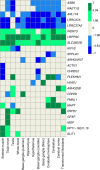Large-scale GWAS identifies multiple loci for hand grip strength providing biological insights into muscular fitness
- PMID: 29313844
- PMCID: PMC5510175
- DOI: 10.1038/ncomms16015
Large-scale GWAS identifies multiple loci for hand grip strength providing biological insights into muscular fitness
Abstract
Hand grip strength is a widely used proxy of muscular fitness, a marker of frailty, and predictor of a range of morbidities and all-cause mortality. To investigate the genetic determinants of variation in grip strength, we perform a large-scale genetic discovery analysis in a combined sample of 195,180 individuals and identify 16 loci associated with grip strength (P<5 × 10-8) in combined analyses. A number of these loci contain genes implicated in structure and function of skeletal muscle fibres (ACTG1), neuronal maintenance and signal transduction (PEX14, TGFA, SYT1), or monogenic syndromes with involvement of psychomotor impairment (PEX14, LRPPRC and KANSL1). Mendelian randomization analyses are consistent with a causal effect of higher genetically predicted grip strength on lower fracture risk. In conclusion, our findings provide new biological insight into the mechanistic underpinnings of grip strength and the causal role of muscular strength in age-related morbidities and mortality.
Conflict of interest statement
R.A.S., D.K.R., A.P. and D.M.W. are employees of GlaxoSmithKline plc. The remaining authors declare no competing financial interests.
Figures



References
-
- Bohannon R. W. Hand-grip dynamometry predicts future outcomes in aging adults. J. Geriatr. Phys. Ther. 31, 3–10 (2008). - PubMed
-
- Taekema D. G., Gussekloo J., Maier A. B., Westendorp R. G. J. & de Craen A. J. M. Handgrip strength as a predictor of functional, psychological and social health. A prospective population-based study among the oldest old. Age Ageing 39, 331–337 (2010). - PubMed
-
- Rantanen T. et al.. Muscle strength as a predictor of onset of ADL dependence in people aged 75 years. Aging Clin. Exp. Res. 14, 10–15 (2002). - PubMed
-
- Kärkkäinen M. et al.. Association between functional capacity tests and fractures: an eight-year prospective population-based cohort study. Osteoporos. Int. 19, 1203–1210 (2008). - PubMed
Publication types
MeSH terms
Substances
Grants and funding
- P30 DK048520/DK/NIDDK NIH HHS/United States
- MR/N003284/1/MRC_/Medical Research Council/United Kingdom
- G1000143/MRC_/Medical Research Council/United Kingdom
- MC_U106179473/MRC_/Medical Research Council/United Kingdom
- R01 AR041398/AR/NIAMS NIH HHS/United States
- MC_UU_12015/2/MRC_/Medical Research Council/United Kingdom
- G0401527/MRC_/Medical Research Council/United Kingdom
- MC_UU_12013/4/MRC_/Medical Research Council/United Kingdom
- U24 AG051129/AG/NIA NIH HHS/United States
- WT_/Wellcome Trust/United Kingdom
- R21 AR056405/AR/NIAMS NIH HHS/United States
- MC_QA137853/MRC_/Medical Research Council/United Kingdom
- MR/N011317/1/MRC_/Medical Research Council/United Kingdom
- UL1 TR002369/TR/NCATS NIH HHS/United States
- MC_UU_12015/3/MRC_/Medical Research Council/United Kingdom
- MC_UU_12015/1/MRC_/Medical Research Council/United Kingdom
- R01 HL105756/HL/NHLBI NIH HHS/United States
- P30 DK072488/DK/NIDDK NIH HHS/United States
- 14136/CRUK_/Cancer Research UK/United Kingdom
- G0902313/MRC_/Medical Research Council/United Kingdom
- U01 HG004436/HG/NHGRI NIH HHS/United States
LinkOut - more resources
Full Text Sources
Other Literature Sources

